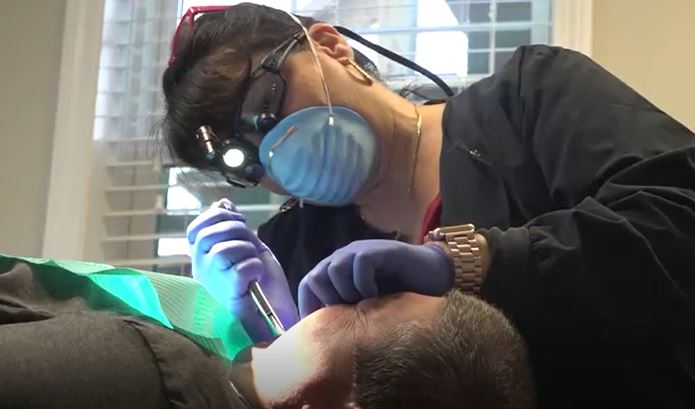
Difference: HowCalgaryDentistsCanHelpOvercomeYourDentalFears (1 vs. 2)
Revision 22023-11-27 - AbdulAlim
| Line: 1 to 1 | ||||||||
|---|---|---|---|---|---|---|---|---|
| Changed: | ||||||||
| < < | How Calgary Dentists Can Help Overcome Your Dental FearsA lot of people have anxiety about visiting the dentist. They might imagine a drill-wielding man in white coat, or they might have a painful memory from the past. Dental anxiety (dentophobia) is a common challenge that prevents patients from getting the oral care they need. It also leads to poor health and self-esteem. 1. Make an Appointment Many people feel apprehension about visiting the dentist, but this fear can be easily overcome. Dental anxiety is very common and itís nothing to be ashamed of. It can be caused by a traumatic past experience, the anticipation of pain during treatment, or the fear of needles or blood. Regardless of the reason for your fears, itís important to discuss them with your dentist so that they can make sure your appointment is as comfortable as possible. A good dentist will always put the comfort of their patients first and they will do whatever they can to make the process as smooth as possible. Some of the best dentists in Calgary NE will even offer music to help distract you from any noise that might be causing you anxiety. Music is a great way to calm your nerves and it can also drown out any noises from the dental drill that might be making you nervous. You can even bring your own headphones if you would like some extra sound cancelling help during your treatment. 2. Talk to Your Dentist
Dental anxiety can be caused by a variety of things. People might be afraid of the sound of a drill, the needles used for numbing injections or seeing blood. Often, these fears stem from past traumatic experiences in childhood or negative interactions with dentists and dental staff. It's important to talk to your Dentist in Calgary
2. Talk to Your Dentist
Dental anxiety can be caused by a variety of things. People might be afraid of the sound of a drill, the needles used for numbing injections or seeing blood. Often, these fears stem from past traumatic experiences in childhood or negative interactions with dentists and dental staff. It's important to talk to your Dentist in Calgary | |||||||
| > > | No | |||||||
|
-- | ||||||||
Revision 12023-10-15 - AbdulAlim
| Line: 1 to 1 | ||||||||
|---|---|---|---|---|---|---|---|---|
| Added: | ||||||||
| > > | How Calgary Dentists Can Help Overcome Your Dental FearsA lot of people have anxiety about visiting the dentist. They might imagine a drill-wielding man in white coat, or they might have a painful memory from the past. Dental anxiety (dentophobia) is a common challenge that prevents patients from getting the oral care they need. It also leads to poor health and self-esteem. 1. Make an Appointment Many people feel apprehension about visiting the dentist, but this fear can be easily overcome. Dental anxiety is very common and itís nothing to be ashamed of. It can be caused by a traumatic past experience, the anticipation of pain during treatment, or the fear of needles or blood. Regardless of the reason for your fears, itís important to discuss them with your dentist so that they can make sure your appointment is as comfortable as possible. A good dentist will always put the comfort of their patients first and they will do whatever they can to make the process as smooth as possible. Some of the best dentists in Calgary NE will even offer music to help distract you from any noise that might be causing you anxiety. Music is a great way to calm your nerves and it can also drown out any noises from the dental drill that might be making you nervous. You can even bring your own headphones if you would like some extra sound cancelling help during your treatment. 2. Talk to Your Dentist
Dental anxiety can be caused by a variety of things. People might be afraid of the sound of a drill, the needles used for numbing injections or seeing blood. Often, these fears stem from past traumatic experiences in childhood or negative interactions with dentists and dental staff. It's important to talk to your Dentist in Calgary
2. Talk to Your Dentist
Dental anxiety can be caused by a variety of things. People might be afraid of the sound of a drill, the needles used for numbing injections or seeing blood. Often, these fears stem from past traumatic experiences in childhood or negative interactions with dentists and dental staff. It's important to talk to your Dentist in Calgary Comments | |||||||
View topic | History: r2 < r1 | More topic actions...
Ideas, requests, problems regarding TWiki? Send feedback